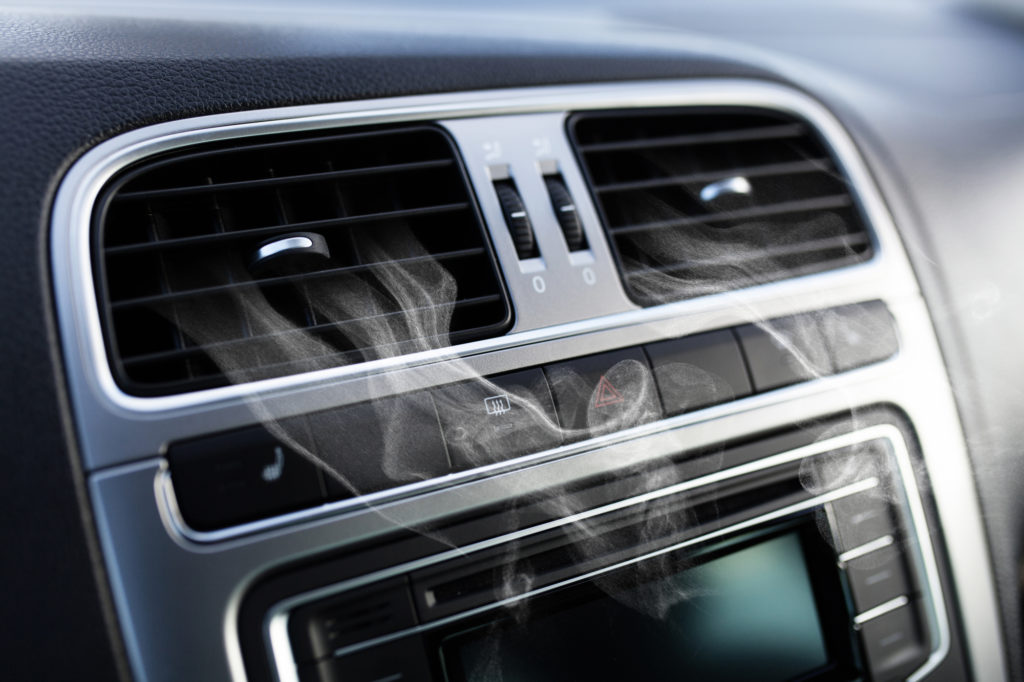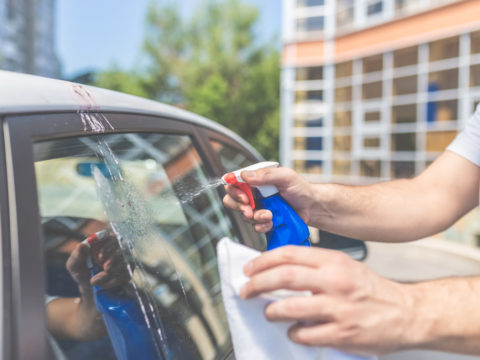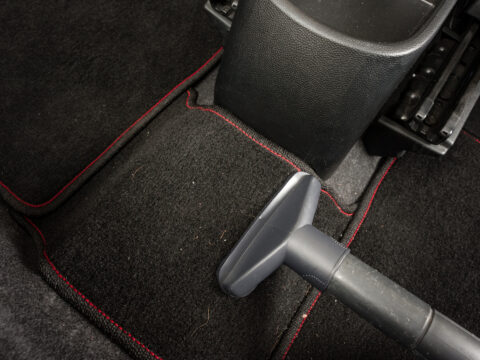Vinegar is fermented liquid magic that can remove smoke odors, test your soil pH, unclog a drain, rescue paintbrushes, settle stomachs, season foods, sanitize, and clean stains.
Unfortunately, a vinegar smell can also indicate that you have trouble if the odor comes from inside your car.
Some smells may be harmless, but if your car smells sour, foul, or vinegary, it is definitely worth the time to investigate and get rid of the odor.

Contents
Where Does the Vinegar Smell Come From?
Anyone can make vinegar from fermenting substances that contain sugars, such as apple cider, sherry, rice, fruit, and wine. The fact that many different organic materials can be the base of this liquid is why the smell of vinegar can vary.
Considering that vinegar is a fermented food, a common source of a vinegar odor is from:
- Foods
- Drinks
- Water bottles
- Other things left in the car
Check your car’s pockets and compartments to ensure the smell isn’t your car’s fault.
What Causes a Vinegar Smell in a Car?
If the vinegar smell persists after removing anything from the car that could smell, you will need to determine what the cause is for the scent. There are common causes to investigate if your nose has trouble locating the source of the vinegar smell.
1) Mold and Mildew in Cabin Vents
If you notice that the vinegary smell gets stronger near the AC or when the air conditioner is running, turn off the AC and air out the car. Keep the AC off and start your vehicle again.
Turn the AC on, and if the smell returns, you may have mold or mildew in the air vents of your car. If you change the air filter and the smell is gone, you have found the source of your vinegary scent.
The smell may require vent cleaning in addition to filter changing, as the vents themselves may have grown.
2) Moisture Accumulation Due to Condensation
Condensation happens when the temperature inside your vehicle is different from the outside. When warm air meets cold air, water vapor turns into actual water or condensation.
Wet items in the car can also cause condensation and funky smells, so be sure to remove damp dog towels or soggy umbrellas.
3) Clogged Cabin Air Filter
One of the symptoms of a clogged cabin air filter is a dirty, musty, or sour odor. Filters trap dust and other foreign particulates not to reach the cabin.
Clogged filters can cause a smell in the cabin instead of filtering the air. Large clogs in a filter accumulating moisture can create unpleasant odors, which is why changing the filter can improve car smells.
4) Condensate Pan Malfunction
The condensate pan catches water and drains it outside your vehicle. When a condensate pan malfunctions or gets clogged, it can result in water backing up into your floorboards.
Wet floorboards and stagnant water can result in mold, mildew, and bacteria growth, all of which are equally smelly. Proper drainage in all pains under your car is essential to keeping the vehicle free from foul odors.
5) Ozone Emissions
Electrical motors create ozone emissions with their use. All vehicles emit gasses that contain foul odors that may get sucked into the ventilation system of your car.
Ozone emissions are harmful to breathe, so it is essential to understand when the ozone emissions are from temporary outside sources or if your car has a faulty ventilation system.
6) Mold in Evaporator Fins and Coils
Bacteria can build up on an air conditioner’s evaporator coil, located in most dashboards. Airflow and condensation can mix with the bacteria to create a slimy film on the AC fins and coils, producing foul smells.
Mold from bacteria can build up and clog the drain line, which results in standing water elsewhere in your car, and more smells.
7) Faulty Car Emission System
Cars need to safely house and transport vapors from fuel and other liquids to where the engine can use or appropriately vent them. If an emission system fails, it can result in some horrible smells reaching your car’s cabin from your car leaking emissions.
Many health problems can arise due to fault emissions systems, making it essential to understand the signs. If a check engine light is present along with your vinegar smell, vent the car immediately and get to a safe area. Seek help from a professional immediately for both medical and auto symptoms.
8) Decaying Organic Material in Car
Foul or vinegary smells can come from decaying organic material. Decay organic material can mean anything from dead leaves to an animal that may have made its home in your car.
As temperatures drop, animals use any vacant car by turning it into their home. Even after a quick drive, animals may crawl under or in your vehicle for the heat.
Leaves can often be removed by hand, but it can be costly to rid an engine of an animal’s nest and requires a professional. If you’ve gone through cleaning out everything you can and still experience a foul odor, it is time to see a professional.
9) Fluid Leaks (Gas leak and Battery Acid Leaks)
Old fluid in cars can sometimes emit a foul odor that smells like vinegar or rotten eggs, depending on the situation. If parts of your car show wear and tear, are leaking, or are poorly connected, especially the catalytic converter, it can leak sulfur gas.
Battery Acid also contains sulfuric acid, resulting in Hydrogen Sulfide emissions, which also smell like vinegar or rotten eggs. Any leak in a car is a severe problem to look into right away.
How to Remove Vinegar Smell in Car
The exact steps you will need to take to remove a vinegar smell from your car depend on a few factors, including the source or sources of compounded problems.
Confirming you are in a well-ventilated area and not in any danger, you can follow the same steps to resolve your foul car smell:
Find the Source of the Smell
The priority is to find the source or sources if a faulty emissions system is causing problems in the ventilation system.
Fix the Problem
If the problem is cleaning, you can move to the next step, but if the problem is something more extensive, you will need to resolve the issue before stopping.
Clean Up the Source
Safely clean up the source of the smell using appropriate cleaning supplies. Don’t be hesitant to use vinegar in your cleaning, provided the problem wasn’t overusing vinegar.
Air It Out
You may need to air things out several times to clear a vinegary smell, but it will be a part of your process.
Change the Air and Cabin Filters
Even if the source of the smell wasn’t your filters, your air and cabin filters can pick up and retain bad scents. Make sure you swap out the air or cabin filter as necessary.
Detail the Vehicle, Both Interior and Exterior
Detailing the car can be done yourself, but don’t be ashamed to call in a professional. Detail both the interior and exterior, if only to reduce potential contaminants or mold spores.

Products for Removing Vinegar Smell in Cars
What product you use to remove the vinegar smell in a car depends on the source of the scent. Removing the scent may involve using vinegar, as it is antifungal and antibacterial and can kill some types of mold.
Some products are especially good at getting rid of the vinegar smell:
- Vinegar and water cleaning solution: If your issue is a food or beverage spill, vinegar might be your solution to resolve the odor. Just don’t use too much vinegar.
- Moisture absorber: You can make a moisture and smell absorber using pantyhose and kitty litter or detergent, or you can purchase professional versions from most auto retailers.
- Baking soda: If you use too much vinegar to clean, you can use baking soda and a water rinse to counter the smell of the vinegar.
- Herbs: Herbs in your vinegar solution or hanging in your car may help counter foul smells.
- Lemon Juice: Lemon juice is a powerful cleaning agent but may result in color changes to fabric, so use sparingly.
- Vodka (no flavors): Vodka is odorless and kills bacteria; use flavorless vodka and a good rinse for special situations.
- Steamers: Hand-held steamers can be effective on the fabrics and non-electronic parts of your car, but be careful not to steam technology.
Get the Car Detailed or Do a Deep Clean
Getting a professional to detail your car can save you time and effort. If you are a DIY, follow some professional tips on the best method to clean.














